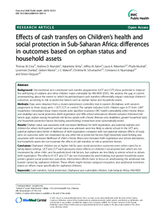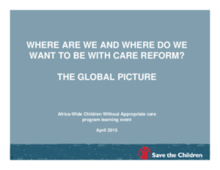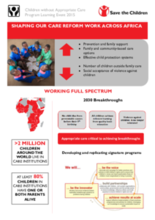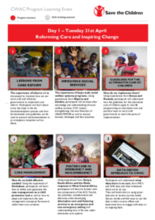Displaying 1141 - 1150 of 1622
LONDON/KAMPALA (Thomson Reuters Foundation) - Ugandan families have been bribed, tricked or coerced into giving up their children to U.S. citizens and other foreigners for adoption, a Thomson Reuters Foundation investigation has found.
This study, conducted in eastern Zimbabwe, addresses the gap in current understanding about the extent to which household-based cash transfers differentially impact individual children’s outcomes, according to risk or protective factors such as orphan status and household assets.
Hope and Homes for Children announces that the last child has just been moved out of Rwanda’s oldest and largest institution.
This document, developed through a mapping exercise conducted by the National Council for Children’s Services (NCCS) and the Department of Children Services (DCS) of Kenya, provides a comprehensive list of the agencies and programs in Kenya that provide services for children.
In an effort to support practitioners to address some challenges of trying to undertake quality research, a group of child protection networks and organizations - the Community Child Protection Exchange, the CP MERG, the CPC Learning Network, and REPSSI - came together to produce this joint newsletter reflecting upon some groups’ successes and challenges working on child protection research and M&E, including working with a limited budget in low-resource settings.
This video briefly recaps the Africa-Wide Children without Appropriate Care Program Learning Event hosted by Save the Children in Addis Ababa, Ethiopia, on 20-23 April 2015.
This presentation provides an overview of the status of care reform efforts in Africa. It identifies where care reform is underway as well as areas in which reform is still needed. The presentation looks ahead to what is needed to accelerate the momentum on care reform in the region.
This presentation was delivered at the Africa-Wide Children Without Appropriate Care Program Learning Event: “Shaping our care reform work across Africa,” held in Ethiopia on 20-23 April 2015. It provides an overview of the Tracking Progress Initiative, which includes the development of a tool to measure country progress in implementing the Guidelines for the Alternative Care of Children.
Various stakeholders, including Better Care Network, met at an Africa wide Program Learning Event on 20-23 April 2015, organized by Save the Children, under the theme “Shaping our care reform work across Africa,” which brought together country, regional and global experts.
This document provides an overview of the topics covered in the various sessions during the three-day program learning event “Shaping our care reform work across Africa,” held in Ethiopia on 20-23 April 2015.




